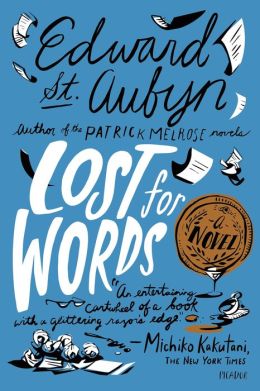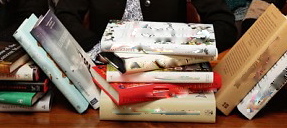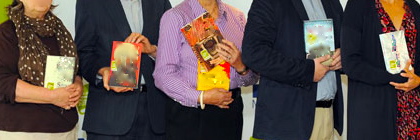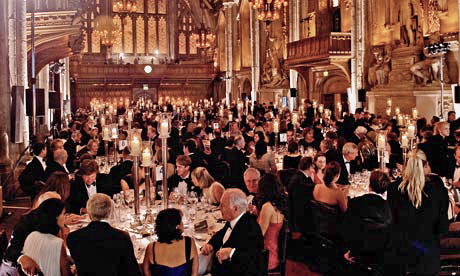Note: This novel by Edward St. Aubyn is WINNER of the 2014 Wodehouse Prize for comic fiction.
“Personally I think that competition should be encouraged in war and sport and business, but that it makes no sense in the arts. If an artist is good, nobody else can do what he or she does and therefore all comparisons are incoherent. Only the mediocre, pushing forward a commonplace view of life in a commonplace language can really be compared, but my wife thinks that ‘least mediocre of the mediocre’ is a discouraging title for a prize…”—Mr. Wo, Shanghai Global Partners, new owners of the Elysian group.
 The fine line between satire and farce is obliterated in this novel about the annual granting of England’s most prestigious literary prize. Author Edward St. Aubyn never hesitates to leap with both feet from satire into bold farce and back, as often as some of his characters jump with both feet into and out of each other’s beds. At the same time, however, he also maintains a bemused and distantly objective point of view regarding the machinations of those authors competing for the Elysian Prize, as well as the judges who must decide the winner, and the literary establishment which recognizes the internal wheeling and dealing but still takes it all seriously. Though the author never mentions the name of the real prize he is satirizing, perhaps the one for which he was once on the Short List, every reader of British literature will have an idea of which among several prizes is being satirized here. The prize in this novel is named for Elysian, a highly controversial agricultural company which manufactures “the world’s most radical herbicides and pesticides, and a leader in the field of genetically modified crops.” Elysian thinks nothing of crossing wheat with Arctic cod to make it frost resistant or lemons with bullet ants to give them extra zest.
The fine line between satire and farce is obliterated in this novel about the annual granting of England’s most prestigious literary prize. Author Edward St. Aubyn never hesitates to leap with both feet from satire into bold farce and back, as often as some of his characters jump with both feet into and out of each other’s beds. At the same time, however, he also maintains a bemused and distantly objective point of view regarding the machinations of those authors competing for the Elysian Prize, as well as the judges who must decide the winner, and the literary establishment which recognizes the internal wheeling and dealing but still takes it all seriously. Though the author never mentions the name of the real prize he is satirizing, perhaps the one for which he was once on the Short List, every reader of British literature will have an idea of which among several prizes is being satirized here. The prize in this novel is named for Elysian, a highly controversial agricultural company which manufactures “the world’s most radical herbicides and pesticides, and a leader in the field of genetically modified crops.” Elysian thinks nothing of crossing wheat with Arctic cod to make it frost resistant or lemons with bullet ants to give them extra zest.
St. Aubyn’s parodies of various literary styles, represented by some of the candidates for the Elysian Prize mentioned here will bring smiles of recognition to many readers. All the World’s a Stage, a book favored by Elysian judge Tobias Benedict, an actor, shows St. Aubyn’s skill in writing sophisticated parodies of Shakespearean drama here. Readers will have great fun identifying which passages from Hamlet, Macbeth, and other plays he borrows from in some of the Shakespearean passages. Conversations between William and Ben [Jonson] and Thomas Kyd and John Webster are delightful, conjuring up all the controversy about who “really” wrote Shakespeare’s plays. Like Shakespeare himself, author St. Aubyns also delights in mining the depths of low humor and farce for other scenes, both Shakespearean and otherwise. The writing of one candidate for the prize, wot u starin at, by Hugh MacDonald, is so full of gutter language involving Death Boy and Wanker that I can only quote it selectively here: Wanker “was fixed ta the corner, as if some (expletive) with a nail gun had shot him through the hands and feet and crucified the sorry (expletive) to Death Boy’s floor….[He] wasna in the mood for a fight, being skag-sick, and [expletive] at the world on account of his AIDS test comin back positive.”

Huge pile of books from which the Elysian Prize nominees are supposed to be chosen by the judges who are “reading” this group.
Penny Feathers, one of the five Elysian judges, a writer of thrillers, has greatly expanded her own output after discovering an app called “Ghost.” When she types in “refugee,” for instance, “several useful suggestions pop up: ‘clutching a pathetic bundle,’ or ‘eyes big with hunger’…Under ‘shoes’ you got ‘badly scuffed,’ ‘highly polished,’ ‘seen better days,’ and ‘bought in Paris.’ She could…scroll and click all day, the word count going up in leaps and bounds.’ ” As judge, Feathers is supporting a book entitled The Enigma Conundrum (my favorite title), which includes a “marvelous portrait of the brilliant…Alan Turing” and an “utterly convincing” portrait of Winston Churchill – “you could almost smell the cigar smoke and the brandy on his breath.”

From the huge number of novels for the year, the judges choose the longlist, from twelve to twenty books long.
Despite the wonderfully over-the-top descriptions, St. Aubyns also manages to maintain a reserve (and a distanced smirk) which gives added punch to the genuine issues he develops within the plot of this novel. Malcolm Craig, a member of Parliament and Under-Secretary of State for Scotland, has been appointed Chairman of the prize committee. The other judges are the aforementioned Penny Feathers, the thriller writer with the Ghost app; Tobias Benedict, the actor, who is also the godson of Sir David Hampshire, the aristocrat in charge of choosing the prize committee; Jo Cross, a well-known columnist and media personality; and Vanessa Shaw, an “Oxbridge academic” who identifies her specific area of interest simply as “good writing.” None of the judges feel any need to read the large number of books that eventually form the Long List – and in choosing the Short List, all have at least one favorite novel – in some cases the only candidate for the prize that they have read at all. One judge does not attend meetings, and Malcolm Craig, himself, is a tool of the wonderfully named publishing house Page and Turner.

Here three female judges and two male, like the judges in this novel, hold the six novels which comprise the shortlist. In the novel, each judge is committed to a particular book and lobbies for that book in the deliberations.
Among the nominees for the prize are the previously mentioned wot you starin at by Hugh Macdonald; All the World’s a Stage by Hermione Fade, the Shakespearean entry; The Enigma Conundrum by Tim Wentworth, supported by Penny Feathers; The Frozen Torrent by Sam Black; and, in a surprise, a book that was submitted by mistake in place of Consequences by author Katherine Burns. The Palace Cookbook by Lakshmi Badanpur, a cookbook with memoir by the auntie of Sonny Badanpur is now being considered for the fiction prize. In search of a new angle, the prize committee has been impressed by the suggestions about life that these recipes represent. The committee is deadlocked in choosing a winner.

The big banquet at which a winner is announced takes place at the Guildhall in this photo by Sarah Lee.
St. Aubyn’s Lost for Words, a book of significant literary accomplishment, gives the lie to the idea that good fiction is dead – its humor, intelligence, and awareness of the greater world not only intact but sparkling, a book which, in its way, celebrates the values which serious readers accept and even admire. Of all the books I have read recently, this one has most tickled my fancy and kept me reading happily during a period in which so much other reading has been ultra-serious and (often) very long. A perfect book for summer written by a well-recognized author who is taking a different and much welcomed tack, Lost for Words may not be on any Short Lists, but it is high on my own Favorites List.
Photos, in order: The author’s photo appears on http://www.abc.net.au/
The big stack of books for the whole year, from which the Elysian Prize nominees are taken, is shown here: http://www.prospectmagazine.co.uk/
 The twelve-book longlist may be found here: http://www.goodhousekeeping.co.uk/
The twelve-book longlist may be found here: http://www.goodhousekeeping.co.uk/
The authors and their choices for the shortlist, which each will support individually, are depicted on http://www.theguardian.com/
The celebration banquet at the Guildhall appears on http://www.theguardian.com Photo by Sarah Lee.
ARC: Picador

